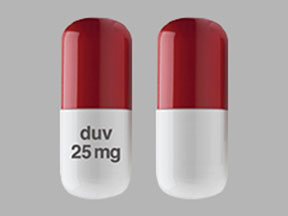Duvelisib Disease Interactions
There are 4 disease interactions with duvelisib.
Duvelisib (applies to duvelisib) colitis
Major Potential Hazard, Moderate plausibility. Applicable conditions: Colitis/Enteritis (Noninfectious)
Serious, including fatal diarrhea or colitis has been reported in 18% of patients receiving treatment with duvelisib. Patients with history of colitis should be monitored closely for any signs or symptoms. Advise patients to report any new or worsening diarrhea. Patients presenting with abdominal pain, stool with mucus or blood, change in bowel habits, peritoneal signs, or with diarrhea that is noninfectious should be followed closely and supportive therapy should be initiated based on severity (antidiarrheal agents, to enteric acting or systemic steroids if needed). A diagnostic work- up to determine etiology, including colonoscopy, should be performed. Monitor at least weekly. Upon resolution of the diarrhea or colitis, treatment can be restarted at a reduced dose. Treatment should be discontinued for recurrent Grade 3 diarrhea or recurrent colitis of any grade.
Duvelisib (applies to duvelisib) infections
Major Potential Hazard, Moderate plausibility. Applicable conditions: Infection - Bacterial/Fungal/Protozoal/Viral
Any infection should be treated prior to initiation of treatment with duvelisib. Serious, including fatal infections have occurred in patients receiving treatment with this drug. The most common serious infections were pneumonia (including fatal pneumocystis jirovecii pneumonia, PJP), sepsis, and lower respiratory infections. Advise patients to report any new or worsening signs and symptoms of infection. In some cases, treatment might need to be suspended while the infection is treated. Prophylaxis for PJP should be provided during treatment, and in some cases also prophylactic antivirals should be considered in patients with history of CMV infection to avoid CMV reactivation.
Duvelisib (applies to duvelisib) hepatotoxicity
Moderate Potential Hazard, Moderate plausibility. Applicable conditions: Liver Disease
Bilirubin and ALT and/or AST elevation has been reported in patients receiving duvelisib. Monitor hepatic function in all patients during treatment with duvelisib. Caution and close monitoring is advised in patients with hepatic impairment.
Duvelisib (applies to duvelisib) neutropenia
Moderate Potential Hazard, Moderate plausibility.
Caution and close monitoring is advised when starting treatment in patients with neutropenia. Grade 3 or 4 neutropenia has been reported in 42% of patients receiving treatment. Monitor neutrophil counts at least every 2 weeks for the first 2 months of duvelisib therapy, and at least weekly in patients with neutrophil counts < 1.0 Gi/L (Grade 3-4). Withhold treatment with duvelisib in patients presenting with neutrophil counts < 0.5 Gi/L (Grade 4). Monitor until ANC is > 0.5 Gi/L, and then resume duvelisib at same dose for the first occurrence or a reduced dose for subsequent occurrence.
Switch to professional interaction data
Duvelisib drug interactions
There are 641 drug interactions with duvelisib.
Duvelisib alcohol/food interactions
There is 1 alcohol/food interaction with duvelisib.
More about duvelisib
- duvelisib consumer information
- Check interactions
- Compare alternatives
- Latest FDA alerts (1)
- Side effects
- Dosage information
- During pregnancy
- Drug class: PI3K inhibitors
- Breastfeeding
- En español
Related treatment guides
Drug Interaction Classification
| Highly clinically significant. Avoid combinations; the risk of the interaction outweighs the benefit. | |
| Moderately clinically significant. Usually avoid combinations; use it only under special circumstances. | |
| Minimally clinically significant. Minimize risk; assess risk and consider an alternative drug, take steps to circumvent the interaction risk and/or institute a monitoring plan. | |
| No interaction information available. |
See also:
Further information
Always consult your healthcare provider to ensure the information displayed on this page applies to your personal circumstances.


